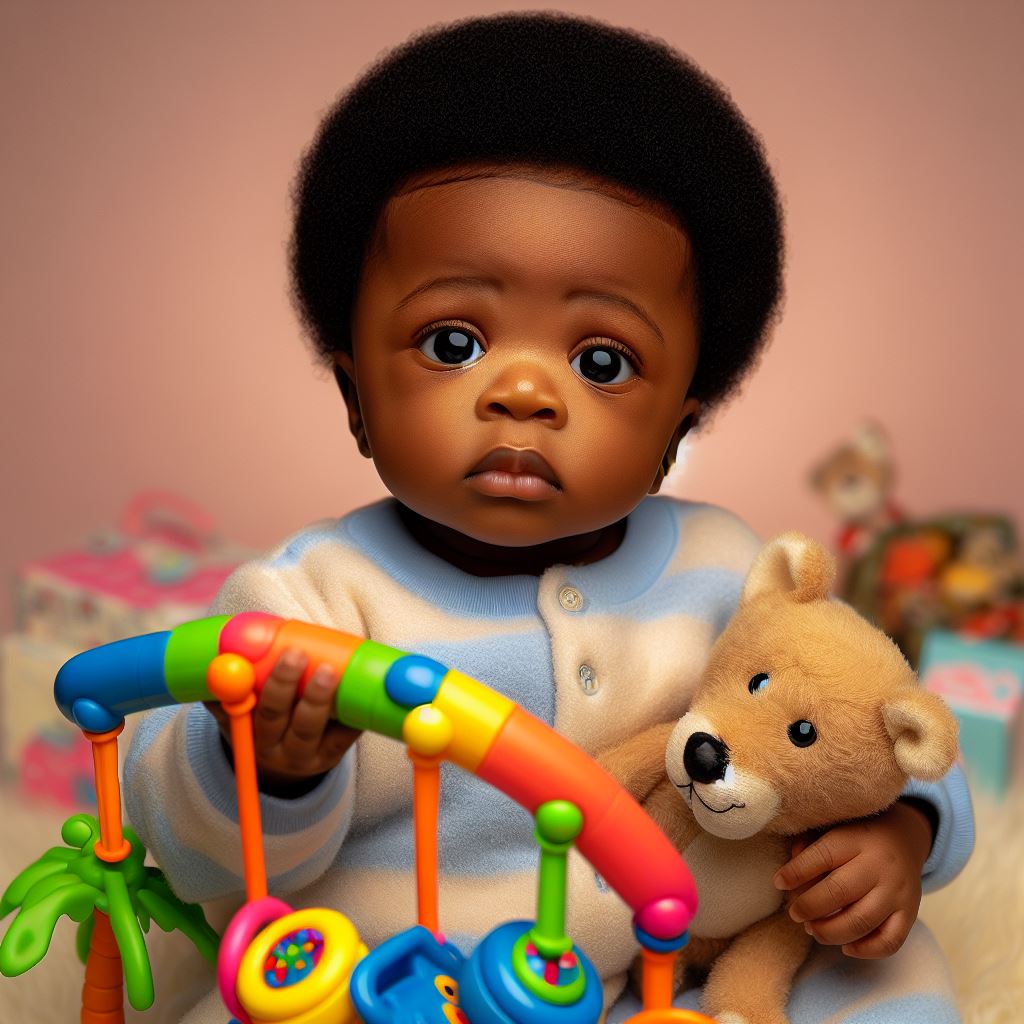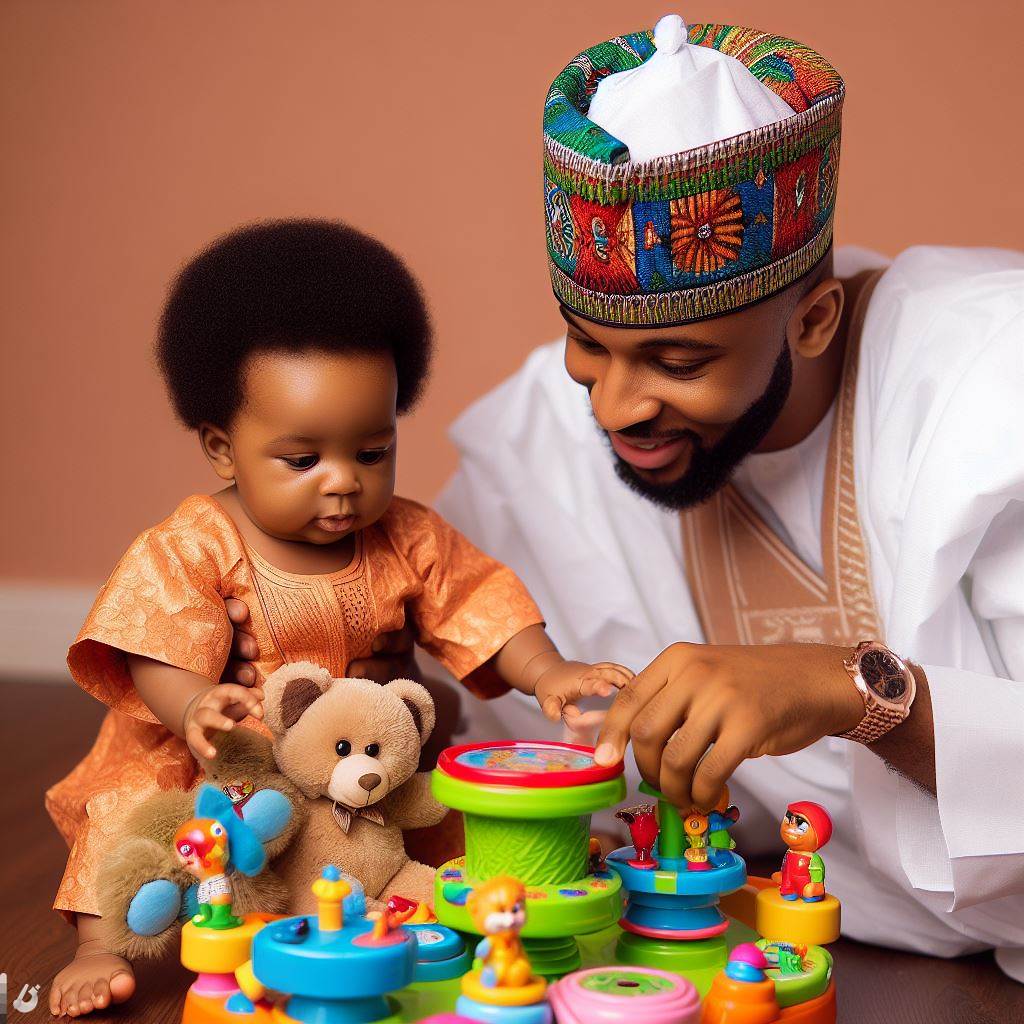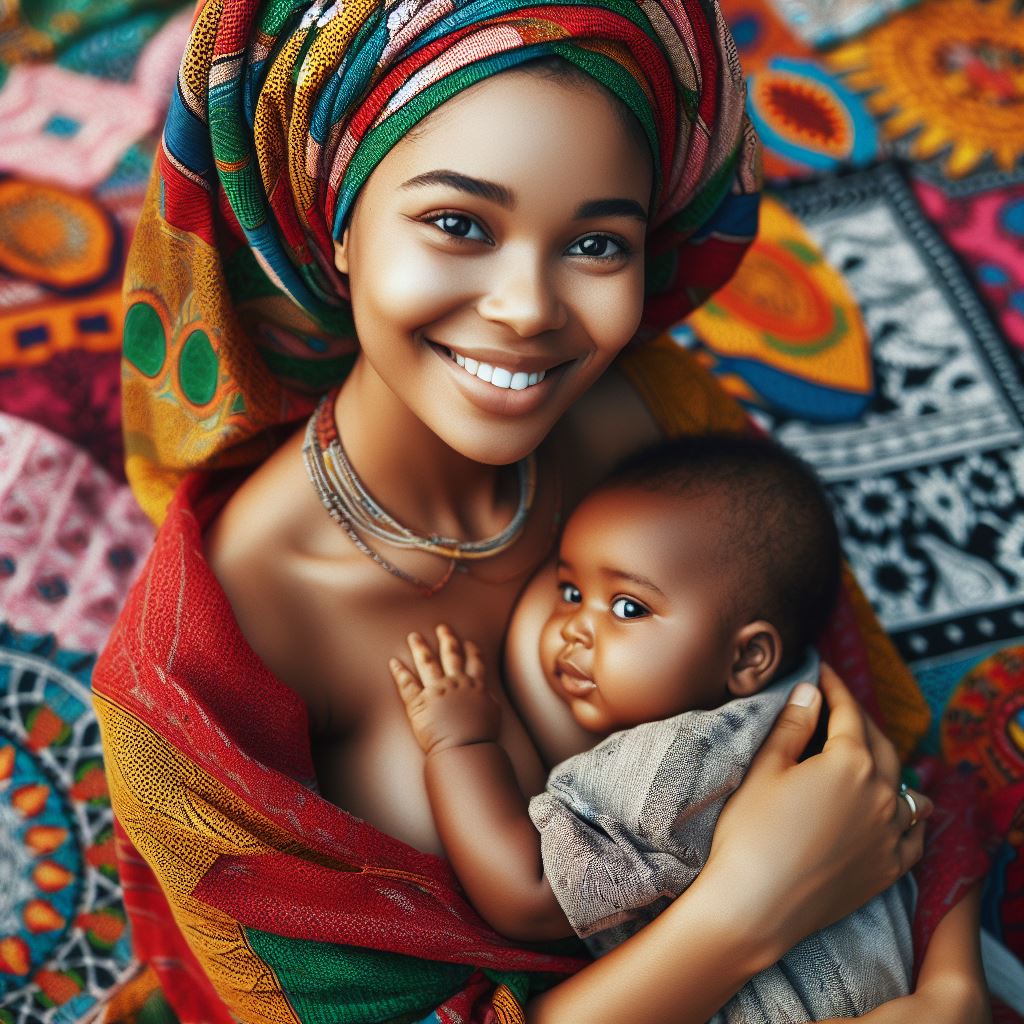Introduction
Physical Activities for Growing Baby: In the vibrant tapestry of Nigerian culture, the journey of a baby’s growth is a celebration of life and vitality.
Physical activities play a pivotal role in sculpting the foundation of a healthy and robust future.
As we delve into this blog post, we’ll explore the significance of these activities in nurturing the development of our Nigerian infants.
The purpose of this blog post is to shed light on the crucial role that purposeful physical activities play in the early stages of a Nigerian baby’s life.
From fostering cognitive development to enhancing motor skills, the impact of these activities is far-reaching.
By understanding the unique needs and cultural context of Nigerian families, we aim to provide practical insights and suggestions for parents and caregivers.
This blog serves as a guide to empower families with the knowledge they need to promote a happy, healthy, and active start for their little ones.
Nigeria’s rich cultural heritage provides a colorful backdrop for engaging activities.
From traditional dances that stimulate coordination to rhythmic music that sparks a sense of joy, incorporating cultural elements into physical play can be both meaningful and enjoyable.
This post delves into specific activities that aid in the development of motor skills.
Benefits of Physical Activities for Growing Nigerian Babies
Physical activities play a crucial role in the holistic development of Nigerian babies, contributing to their overall well-being.
Engaging in age-appropriate exercises and play not only ensures their physical health but also nurtures various aspects of their cognitive and social development.
Development of Gross Motor Skills
One of the primary benefits of encouraging physical activities in growing Nigerian babies is the development of gross motor skills.
Through activities like crawling, walking, and playing with toys, babies enhance their coordination and control over their body movements.
This foundation is essential for future milestones, such as running and jumping.
Parenting Made Just for You
Get personalized Parenting Solutions tailored to your child’s needs. Transform your parenting journey with expert guidance in 1-3 days.
Get StartedImproved Muscle Strength and Coordination
Regular physical activities contribute to the improvement of muscle strength and coordination in growing Nigerian babies.
Simple activities like tummy time and reaching for objects help in building core muscles and refining hand-eye coordination.
This, in turn, prepares them for the challenges of later physical activities and sports.
Enhanced Cognitive Development
Physical activities aren’t just about moving muscles; they also stimulate the brain.
Engaging in activities that involve exploring their environment, such as reaching for objects or playing with different textures, enhances cognitive development.
These experiences lay the groundwork for problem-solving skills and cognitive flexibility.
Promotion of a Healthy Lifestyle and Weight Management
Establishing a routine of physical activities from a young age sets the stage for a lifelong commitment to a healthy lifestyle.
In a time where childhood obesity is a concern, promoting regular physical activity helps in weight management and reduces the risk of related health issues. It instills habits that contribute to a healthier future.
Socialization and Peer Interaction
Physical activities provide an excellent platform for socialization and peer interaction.
Whether it’s participating in group activities or simply sharing toys, babies learn to navigate social situations.
These interactions foster essential social skills, including cooperation, sharing, and communication.
In essence, incorporating physical activities into the daily routine of growing Nigerian babies is an investment in their overall development.
From motor skills to cognitive abilities and social competence, the benefits are diverse and far-reaching.
As caregivers, providing opportunities for these activities ensures a strong foundation for a healthy, active, and socially adept future.
Unveil the Perfect Name that Tells Your Family's Story
Let us help you find a name that embodies your family's values, traditions, and dreams. Our personalized consultation weaves cultural insights to create a name that's uniquely yours.
Get StartedRead: The Role of Music in Baby Brain Development
Suitable Physical Activities for Nigerian Babies
Welcoming a new life into the world brings immense joy and responsibility.
As your baby grows in Nigeria, it’s crucial to nurture their physical development through age-appropriate activities.
Here’s a guide to engaging your little one in activities that promote healthy growth and development.
Tummy Time Exercises
Importance of Tummy Time
Tummy time is essential for strengthening your baby’s neck, shoulder, and core muscles. It aids in preventing flat spots on the head and promotes motor skills development.
Recommended Duration and Frequency
Start with a few minutes a day, gradually increasing as your baby becomes more comfortable. Aim for at least 15 minutes, two to three times a day.
Various Tummy Time Exercises and Their Benefits
Include activities like placing toys just out of reach to encourage reaching and grasping. This helps in developing hand-eye coordination and motor skills.
Baby Yoga and Stretching Exercises
Baby Yoga
It involves gentle stretches and movements that enhance flexibility and promote relaxation. It’s a delightful way to bond with your baby.
Benefits of Baby Yoga and Stretching Exercises
Baby yoga helps improve sleep patterns, digestion, and muscle tone. It also fosters a sense of body awareness in your little one.
Simple and Safe Yoga Poses for Babies
Explore poses like the Happy Baby pose and Gentle Cobra stretch. Always ensure that the movements are slow and gentle, respecting your baby’s comfort.
Interactive Playtime Activities
Importance of Interactive Playtime
Interactive playtime builds cognitive and motor skills. Use colorful toys, soft textures, and stimulating sounds to capture your baby’s attention.
Types of Activities to Promote Physical Development
Incorporate activities like rolling a ball for your baby to grasp or playing peek-a-boo to enhance object permanence.
Engaging and Fun Games for Nigerian Babies
Explore traditional Nigerian games adapted for infants, incorporating cultural elements into playtime.
Baby Swimming and Water Play
Baby Swimming
Introduce your baby to water gradually, ensuring a positive experience. Baby swimming enhances muscle strength and coordination.
Benefits of Swimming for Babies
Swimming aids in respiratory development, promotes bonding, and offers a sensory experience. Use baby-friendly pools and follow safety guidelines.
Precautions and Safety Guidelines for Baby Swimming
Always supervise your baby in the water, use proper flotation devices, and ensure a comfortable water temperature.
Incorporating these activities into your routine not only promotes physical development but also strengthens the parent-child bond.
Enjoy these moments of growth and discovery with your precious Nigerian baby.
Read: Creating a Stimulating Home Environment for Babies

Incorporating Physical Activities into Daily Routine
As your Nigerian baby continues to grow, it’s crucial to foster their physical development through intentional and enjoyable activities.
Incorporating physical activities into your baby’s daily routine not only promotes their overall well-being but also lays the foundation for a healthy and active lifestyle.
Here are key strategies to seamlessly integrate physical play into your baby’s day:
Creating a Safe and Conducive Environment for Physical Activities
Ensure that your baby’s play area is safe and stimulating.
Soft, age-appropriate toys, colorful mats, and cushions create an inviting space for exploration.
Remove any potential hazards and secure furniture to prevent accidents. This setting encourages your baby to move freely and enhances their motor skills.
Establishing a Flexible Schedule for Active Playtime
Designate specific times for active play throughout the day.
Babies thrive on routine, so having a consistent schedule helps them anticipate and look forward to playtime.
Consider morning stretches, midday tummy time, and an evening play session.
Adjust the duration based on your baby’s energy levels and interest, allowing for flexibility within the routine.
Engaging Family Members and Caregivers in Physical Activities
Make physical activities a family affair.
Encourage older siblings, grandparents, or caregivers to join in the playtime fun.
This not only strengthens family bonds but also introduces variety and social interaction into your baby’s physical development.
Simple activities like crawling races, gentle tossing, or playful music and movement sessions can be enjoyed by everyone.
Combining Physical Activities with Other Tasks and Routines
Maximize efficiency by incorporating physical play into daily tasks.
During diaper changes, encourage leg kicks and stretches.
Turn bath time into a splashing, interactive experience.
Engage in babywearing during household chores, providing closeness and movement simultaneously.
This multitasking approach ensures that physical activities seamlessly integrate into your daily routine.
In review, weaving physical activities into your Nigerian baby’s routine creates a holistic approach to their development.
By prioritizing safety, routine, family involvement, and integration with daily tasks, you set the stage for a healthy and happy upbringing, fostering lifelong habits of physical well-being.
Read: Healthy Sleep Patterns for Nigerian Babies
Cautions and Safety Tips for Physical Activities
Supervision and monitoring during physical activities
When engaging in physical activities with your growing Nigerian baby, it is important to provide constant supervision and monitoring.
Babies are still developing their coordination and balance, and accidents can happen in an instant.
Stay by their side at all times to ensure their safety and intervene immediately if necessary.
Suitable environments for physical activities
Ensure that the environment in which your baby engages in physical activities is suitable and safe.
Remove any sharp or dangerous objects from their surroundings, secure electrical cords, and check for any potential risks.
It is also important to provide adequate space for their movements and ensure that the area is free from trip hazards.
Choosing age-appropriate equipment and toys
When selecting equipment and toys for your baby’s physical activities, choose those that are appropriate for their age and developmental stage.
Avoid toys or equipment with small parts that can be a choking hazard.
Ensure that the items are sturdy, stable, and in good condition to minimize the risk of accidents or injuries.
Listening to the baby’s cues and signs of fatigue or discomfort
Pay attention to your baby’s cues and signals during physical activities.
If they appear tired, fussy, or uncomfortable, it may be a sign that they need a break or a change in activity.
Stop the activity and provide them with a calm and soothing environment to rest and recharge. Always prioritize your baby’s comfort and well-being.
Basic first aid and emergency preparedness
Accidents can happen even with the most careful supervision.
It is essential to have basic first aid knowledge and be prepared for emergencies.
Keep a first aid kit handy, know how to respond to common injuries, and have emergency contact numbers readily available.
Quickly attending to any injuries or emergencies can make a significant difference in your baby’s safety and well-being.
Read: Nigerian Baby Language Development Tips
Conclusion
The Benefits of Physical Activities for Growing Nigerian Babies
As we conclude our exploration into the world of physical activities for growing Nigerian babies, let’s take a moment to recap the incredible benefits that engaging in these activities brings to your little one.
Physical development is a crucial aspect of a child’s overall growth, and the advantages are manifold.
From enhanced motor skills to improved cognitive abilities, regular physical activities set a solid foundation for a healthy and active lifestyle.
These activities promote the development of strong muscles and bones, laying the groundwork for a robust and resilient physique.
Moreover, the exposure to different movements and sensory experiences contributes to the refinement of coordination and balance, crucial skills that will serve your baby well as they navigate the world around them.
Encouragement for Parents to Prioritize and Engage in Physical Activities
Parental involvement is key to maximizing the benefits of physical activities.
As we’ve seen, your active participation not only fosters a strong parent-child bond but also provides a secure environment for your baby to explore and learn.
Whether it’s through interactive play, guided exercises, or outdoor adventures, your presence serves as a source of encouragement and support.
Take the time to create a routine that incorporates physical activities into your daily life.
Be it a playful session in the park, a mini dance party in the living room, or a gentle stretching routine before bedtime – each interaction adds up to form a foundation of health and well-being for your growing Nigerian baby.
In the end, let’s embark on this exciting journey of physical development with our Nigerian babies, recognizing the immense benefits and joys it brings to both parent and child alike.
Through play, interaction, and a commitment to a healthy lifestyle, we lay the foundation for a future filled with vitality and well-rounded development.




